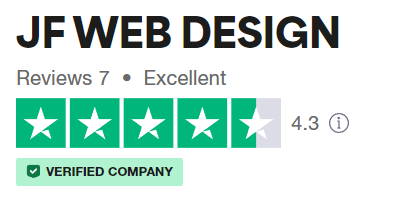Why is it important to maintain your website?
Your website is a crucial part of your business, it is the online storefront that creates your first impression. This is why it’s vital to ensure that your website is consistently functioning, secure and user friendly. So, is website maintenance important? Let’s dive in.
Ensuring website availability
Most of the time today’s advanced servers rarely go down so what was once a problem where servers would have a lot of downtime is a thing of the past. However this doesn’t always mean your site will be available. Since more people are using tools to build their site sometimes these are prone to errors, updates and numerous other problems. While building a site has been made more efficient by these range of tools, maintaining them or finding and fixing errors has become more complicated.
If your website isn’t accessible you might not notice until you’ve missed out on leads, sales or it’s hurt your SEO efforts. Which can result in huge losses of earnings.
To minimize the risk of down time it is important to keep your website up to date, run software scans, monitor its performance and implement security measures where possible. Which takes us on to the next point.
Protecting against security threats
A website that is compromised is a disaster. It can jeopardize customer data and tarnish your reputation. Or even worse lead to legal complications.
Websites can be hacked through methods like malware infections, SQL injections, phishing attacks and more. Many of these things the average website owner isn’t even aware of nevermind taking measures to counter. There are scanning tools that exist that can help find and remove infections. But a more complicated virus and maliciously injected code might need the help of a professional to identify and remove.
Keeping content fresh and relevant
A newer concept to why website maintenance is important is content can become outdated, irrelevant or possibly not reflect your company values anymore. In today’s fast paced world keeping your content fresh is not only good for your users but could be important to your companies reputation.
There is also the chance to update your products, attract new customers and maintain an overall professional image. How many times have you been to a website and seen a company that looks like it might not even exist anymore? When in reality they’re operating completely different to what their website suggests. Even simple things like ‘copyright all rights reserved 2005’ at the bottom of your website is enough to make people click away. Don’t lose customers with an outdated website!
Is website maintenance important for enhancing SEO ranking?
Great SEO is like free advertisement! Well…kind of. While ranking high on google might take considerable time and budget to perfect, once you are there you have the chance to generate 100s or 1000s of leads without spending on monthly advertising. Customers come to you. However once you are there you don’t want to lose out on your efforts. So maintaining your website’s quality, speed, and keyword relevance is crucial.
Improving user-friendliness
People like things to be easy. No one wants to come to a website to be overwhelmed by what they see. But even if your website was considered user friendly when it was built, today might be a different story. Web standards and user experience principles are constantly changing. So ensuring your website is up to date on all fronts is essential to keeping potential new customers on your page.
Enhancing loading speed
A slow-loading website can frustrate visitors and lead them to abandon your site. Optimizing your website’s loading speed is crucial for a positive user experience and maximizing engagement.
To improve loading speed, optimize your website’s code and images, leverage content delivery networks (CDNs), minimize CSS and JavaScript files, avoid excessive plugin usage, and perform tests on various devices and browsers.
Regularly backing up your website
Regularly backing up your website’s files and database is crucial in case of unexpected events like server crashes or cyberattacks.
Options for backing up your website include using a web hosting provider that offers automatic backups, utilizing third-party backup services, or manually backing up your website.
Monitoring website traffic
Monitoring your website’s traffic provides valuable insights into user behavior, traffic sources, and user engagement. This information helps you improve your website’s SEO ranking and ensure it meets visitors’ needs.
Tools like Google Analytics and StatCounter can help you monitor your website’s traffic effectively.
Measuring website performance
Measuring your website’s performance allows you to identify areas of success and areas that need improvement. By understanding its strengths and weaknesses, you can make informed decisions to enhance its performance and achieve your business goals.
Tools like Google Analytics and Pingdom offer performance measurement capabilities.
Enhancing overall website performance
By following these maintenance practices, you can improve your website’s overall performance, making it more reliable, secure, user-friendly, and search engine-friendly. As a result, you can expect increased website traffic, leads, and sales.
In conclusion, maintaining your website is crucial for its continuous functionality, security, and user-friendliness. By adhering to these tips, you can ensure your website remains accessible, secure, and optimized for success.
Who can help me maintain my website?
If you lack the time or expertise to maintain your website, you have the option to hire a web developer or a professional website maintenance company. Investing in website maintenance can safeguard your online reputation, increase website traffic, and boost your sales.
Here are some additional tips for website maintenance:
- Create a website maintenance plan: Outline regular tasks such as updating content, scanning for malware, and monitoring traffic.
- Allocate time for maintenance: Set aside dedicated time each week to check on your website’s condition and ensure it’s in good shape.
- Utilize website maintenance tools: Explore automation tools that can help streamline certain maintenance tasks.
- Seek professional assistance: If maintaining your website becomes overwhelming, consider hiring a web developer or website maintenance company. To view our website maintenance services click here
By following these suggestions, you can ensure your website is consistently well-maintained, performing optimally, and contributing to the growth of your business.
Need a new website? Explore our website design services by clicking here.

